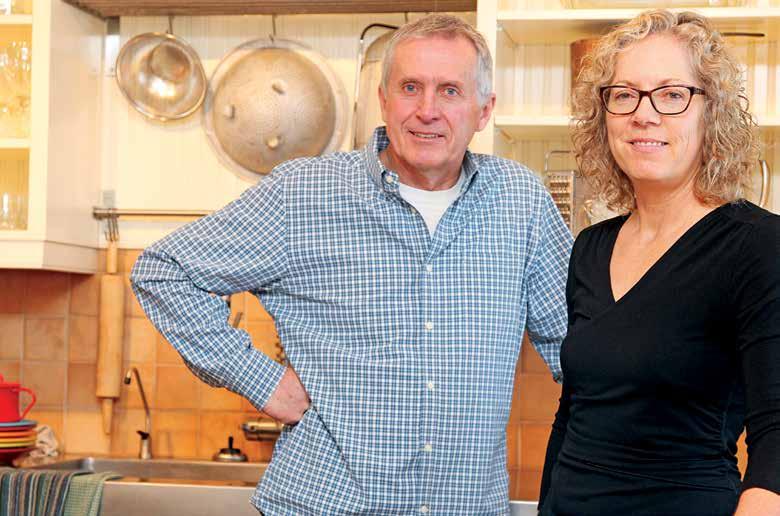
4 minute read
Striking liquid gold
HIGHWOOD CROSSING: STRIKING LIQUID GOLD
anola oil, the product that comes from the great yellow crop of the prairie provinces, has never been as sexy as olive oil, its Mediterranean cousin.
Advertisement
Despite its usefulness, canola gets a bad rap from the anti-GMO crowd and is often downplayed because of its relatively neutral flavour and general ubiquity. But canola is one of Alberta’s key crops and something that food lovers are increasingly embracing, thanks to pioneering organic producers like Highwood Crossing in High River, Alberta.
Although they make plenty of other grain-based goodies, Highwood Crossing’s calling card is its organic hard-pressed canola oil, an unrefined and non-GMO C
BY ELIZABETH CHORNEY-BOOTH
oil that’s packed with distinctive flavour. Popular with home cooks and restaurant chefs alike, the oil may be what put Highwood Crossing on the modern map, but owners Tony and Penny Marshall’s story goes much deeper.
A relatively small farm on the Highwood River, Tony Marshall’s family has been farming at Highwood Crossing since 1899, but the company’s roots as an organic grower started in the late ‘80s when the couple took over the farm. In the past the mixed-use farm had been used for grain, cattle and heavy horses—Tony’s great grandfather and his neighbour, George Lane of the Bar U Ranch, brought the first Percheron horses to Canada from France—but the younger Marshalls wanted to do something different, while still paying homage to the roots of the farm.
“When Penny and I got married and took over the farm, we fairly quickly made the transition back to organic production,” Tony says. “My grandfather and great-grandfather would have farmed organically, but it would have been organic by default. We wanted to use many of the same practices that they would have used.”
The Marshalls didn’t have one definitive reason for going organic, but they did have young children at the time and were conscious of what they were putting into the world, and as a professional home economist, Penny understood
the value of good, chemical-free food. With the farm’s beautiful location on the river the Marshalls were also concerned about chemical run-off. As well, back in the late ‘80s and early ‘90s, there was a noticeable shortage of organic products in the local market that they were able to fill.
Once the farm had been chemical-free for three years and could be certified organic, the Marshalls set to developing some commercial products. During some business travel Tony came across an oil press and started pressing canola and flax oil to sell at local farmers’ markets. The first day of sales was a rousing success— people loved the idea of the organic oils and clamoured to buy them. Feeling like they’d hit the jackpot, the Highwood Crossing team returned the next week and quickly realized that premium oil isn’t a weekly purchase for most people.
“People were blown away and our first week of sales was incredible,” Tony says. “But I came back from that second market and told Penny that we’d need some more products. So she developed a recipe for a muffin and pancake mix and our power grains hot cereal, which is a blend of flax and a number of different whole grains. We had some friends who had a little mill and we started milling different flours. So we went from basically having just two products to the 40 different products that we now sell.”
While Highwood Crossing will always be best known for its oils, Tony says that the label’s granolas and steel cut oatmeal well outsell the oils, largely because many customers consume them ever day. The rise in organic bread bakers has also put the company’s flours into high demand. As its popularity grew in local farmers’ markets, Highwood Crossing began moving into the retail market, starting with health food stores like Calgary’s Community Natural Foods and eventually moving into major supermarket chains all over the province. The brand is also a favourite of many restaurant chefs and appears on menus of places like the River Café in Calgary, which was an early adopter of local organics. The farm will also ship orders placed on highwoodcrossing.com anywhere in the country. When the Marshalls started farming organically they didn’t foresee themselves being at the forefront of a movement, but 30 years later, Tony says that they were clearly “at the right place at the right time” marketing-wise. While customers love Highwood Crossing for its quality as well as its organic nature, the Marshalls don’t consider themselves organic activists. They just continue to make wholesome food in a way that makes both themselves and their customers happy.
“What we’re doing works for us,” Tony says. “It works for the size of our land. It works for our belief system and our philosophy of being able to add value and to sell either directly to the end user or to restaurants and bakeries. We’re not getting up on an apple crates and saying this is the way that everyone should do it. But it works for us.”
Cookbook author and regular contributor to CBC Radio, Elizabeth is a Calgary-based freelance writer, who has been writing about music and food, and just about everything else for her entire adult life.











